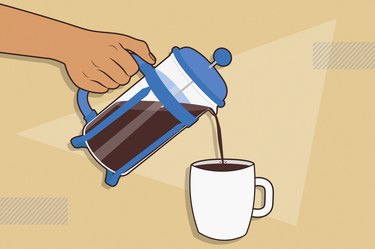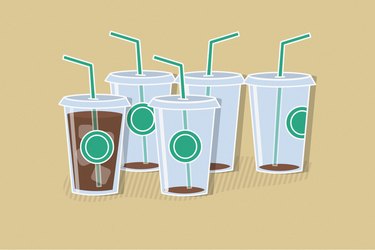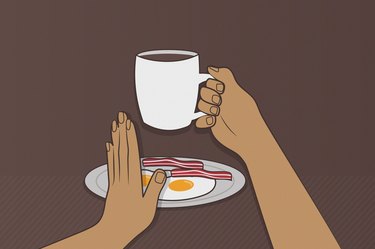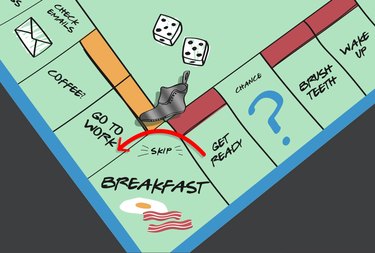
Drinking coffee comes with a bevy of health benefits, especially for your heart, but the way you brew your beans makes a difference.
Yep, brewing methods — such as French press and other unfiltered preparation techniques — may contribute to heart-related health concerns.
Video of the Day
Video of the Day
Here, Bonnie Taub-Dix, RDN, author of Read It Before You Eat It — Taking You from Label to Table, helps us break down the brouhaha over unfiltered brews like French press, including how they stack up against filtered coffee varieties when it comes to heart health.
Filtered vs. Unfiltered Coffee
Filtered coffee is just as it sounds: During the brewing process, coffee grounds pass through a paper filter, which strains substances the beans release when steeped in water. Drip or pour-over coffees are popular examples of this filtered method.
Unfiltered coffee forgoes the filter and is made by simmering ground coffee beans directly in boiling water and briefly letting them steep. French press, Turkish-style brews and espresso are all products of an unfiltered brewing process.
Cons of Unfiltered Coffee for Heart Health
Unfiltered coffee may hinder heart health to an extent, Taub-Dix says. That's what a large, 20-year study involving more than half a million people found: Unfiltered coffee drinkers had higher mortality rates than those who drank filtered coffee.
More specifically, unfiltered brew drinkers were observed to have a greater risk of dying from heart disease, ischemic heart disease or stroke, according to an April 2020 study in the European Journal of Preventive Cardiology.
But why does your French press potentially produce problems for your pumper?
Unfiltered brew contains diterpenes, which are oily substances found in coffee beans that can raise your "bad" LDL cholesterol, according to Harvard Health Publishing. And high cholesterol levels can increase your chances of heart disease, heart attack and stroke.
With a filter, most diterpenes get strained, but minus a filter, many end up in your coffee mug. Indeed, a cup of unfiltered brew boasts 30 times more diterpenes than a cup of its filtered counterpart, per Harvard Health Publishing.
(Possible) Pros of Unfiltered Coffee for Heart Health
On the other hand, for some people, a strong coffee, like an unfiltered French press or espresso, will supply a big burst of energy that can be advantageous while exercising, Taub-Dix says. And, theoretically, performing at your peak can help strengthen your heart, she adds.
There's some scientific evidence to support this idea. A March 2019 umbrella review in the British Journal of Sports Medicine concluded that caffeine intake enhances exercise performance, improving endurance, strength and power.
Cons of Filtered Coffee for Heart Health
While the April 2020 European Journal of Preventive Cardiology study found that filtered coffee was associated with a lower rate of death and heart-related problems, filtered brew isn't without risks thanks to its caffeine content. Especially if you're drinking it excessively.
Up to 400 milligrams of caffeine a day (about 4 cups of coffee) is safe for most adults, but too much of this energy-boosting chemical can raise blood pressure, according to Harvard Health Publishing. A surplus of caffeine can also cause nervousness, heart palpitations, the jitters and insomnia.
Still, for some, a small dose of caffeine can be concerning. People who are more sensitive to caffeine may experience unwanted side effects — like restlessness and sleep problems — even when they take in small amounts of caffeine, according to the Mayo Clinic.
The thing is, if your cup of joe is sabotaging your sleep over the long term, it may even increase your odds of developing chronic conditions like heart disease, per Harvard Health Publishing.
Pros of Filtered Coffee for Heart Health
But if you sip filtered coffee in moderation — sticking to a max of 4 cups a day — your brew can come with some serious heart perks.
That's because mild amounts of caffeine can be cardioprotective. Enjoying at least 1 cup of caffeinated coffee a day is associated with a lower incidence of heart failure, per a February 2021 Circulation: Heart Failure study.
What's more, coffee contains heart-healthy vitamins and minerals (such as magnesium, potassium and niacin) and potent polyphenols, which possess antioxidant properties to help prevent cell damage, according to Harvard Health Publishing.
Combined, these components help your body maintain healthy blood sugar levels, increase metabolic rate and improve your blood vessels' ability to contract and relax, per Harvard Health Publishing. These physiological effects may help explain why coffee intake is linked to lower blood pressure, less weight gain and a reduced risk of type 2 diabetes and heart disease.
How to Drink Coffee for Heart Health
Follow these simple strategies to get the most heart benefits out of your morning cup:
1. Use a Filter
If possible, opt for filtered brews (like drip or pour-over coffee) and save your unfiltered coffee for special occasions.
2. Monitor Your Cholesterol
But if you're a fanatic for French press and other unfiltered coffees, work with your doctor to keep track of your cholesterol to ensure your LDL doesn't rise to harmful levels, per Harvard Health Publishing.
3. Listen to Your Body
"When it comes to coffee, and caffeine in general, you need to know yourself," Taub-Dix says.
"Does caffeine give you the jitters or heart palpitations? Does caffeine make your stomach hurt? Does caffeine help you think more clearly or perform better when exercising? Only you can answer those questions," she says.
4. Sip in Moderation
"As with any other food or beverage, just because a little is good, doesn't mean that a lot will be better," Taub-Dix says.
Case in point: In the April 2020 European Journal of Preventive Cardiology study, people who drank 1 to 4 cups of filtered coffee a day had the lowest mortality rate while those who drank 9 or more cups of unfiltered brew per day had the highest.
5. Time Your Coffee Carefully
"Many people can tolerate a cup or two of coffee in the morning, but once they go past late afternoon, they're looking at sleepless nights and a more anxious feeling," Taub-Dix says.
Again, listen to your body. If your java gives you a jolt that interferes with your sleep, take your coffee earlier in the day.
The Bottom Line
While the April 2020 European Journal of Preventive Cardiology study demonstrated a link between filtered coffee and lower mortality rates, it didn't definitively prove that filtered brews are better or more nutritious than unfiltered kinds.
For people with a history of high cholesterol or heart issues, it might be a good idea to cut back a bit on French press and other unfiltered coffee varieties.
But if you don't have any heart-related issues or high cholesterol, and you enjoy unfiltered coffee without unpleasant side effects, then keep that mug as a part of your morning ritual, Taub-Dix says.
- European Journal of Preventive Cardiology: “Coffee consumption and mortality from cardiovascular diseases and total mortality: Does the brewing method matter?”
- Harvard Health Publishing: “Pressed coffee is going mainstream — but should you drink it?”
- Harvard Health Publishing: “What’s the healthiest way to brew coffee?”
- British Journal of Sports Medicine: “Wake up and smell the coffee: caffeine supplementation and exercise performance-an umbrella review of 21 published meta-analyses”
- Mayo Clinic: “Caffeine: How much is too much?”
- Circulation: Heart Failure: “Association Between Coffee Intake and Incident Heart Failure Risk”
Was this article helpful?
150 Characters Max
0/150
Thank you for sharing!
Thank you for your feedback!



